

Integral Leadership Manifesto. Indistinct Union: Christianity, Integral Philosophy, and Politics. I was hoping to get to this a little earlier, but I’ve been very busy recently.
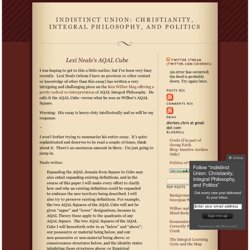
Lexi Neale (whom I have no previous or other contact or knowledge of other than this essay) has written a very intriguing and challenging piece on the Ken Wilber blog offering a pretty radical re-interpretation of AQAL Integral Philosophy. He calls it the AQAL Cube–versus what he sees as Wilber’s AQAL Square. Warning: His essay is heavy-duty intellectually and so will be my response. I won’t bother trying to summarize his entire essay. It’s quite sophisticated and deserves to be read a couple of times, think about it. Neale writes: Expanding the AQAL domain from Square to Cube may also entail expanding existing definitions, and in the course of this paper I will make every effort to clarify how and why an existing definition could be expanded to embrace the new territory being described.
You may notice here a potential re-metaphysicalizing of Wilber’s post-metaphysical turn . For example Neale writes: Ken Wilber: The Integral Vision. Excerpts from Introduction to Volume Seven of the Collected Works We live in an extraordinary time: all of the world's cultures, past and present, are to some degree available to us, either in historical records or as living entities.
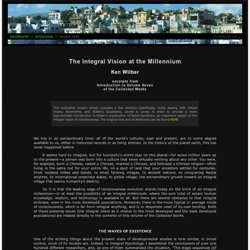
In the history of the planet earth, this has never happened before. It seems hard to imagine, but for humanity's entire stay on this planet—for some million years up to the present—a person was born into a culture that knew virtually nothing about any other. You were, for example, born a Chinese, raised a Chinese, married a Chinese, and followed a Chinese religion—often living in the same hut for your entire life, on a spot of land that your ancestors settled for centuries. From isolated tribes and bands, to small farming villages, to ancient nations, to conquering feudal empires, to international corporate states, to global village: the extraordinary growth toward an integral village that seems humanity's destiny. 1. 2. 3. 4. Ken Wilber. Kenneth Earl "Ken" Wilber II (born January 31, 1949, in Oklahoma City, Oklahoma) is an American writer and public speaker.
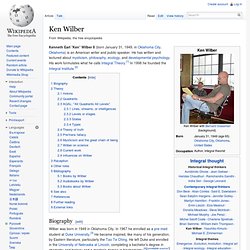
He has written and lectured about mysticism, philosophy, ecology, and developmental psychology. His work formulates what he calls Integral Theory.[1] In 1998 he founded the Integral Institute.[2] Biography[edit] Wilber was born in 1949 in Oklahoma City. In 1967 he enrolled as a pre-med student at Duke University.[3] He became inspired, like many of his generation, by Eastern literature, particularly the Tao Te Ching. In 1973 Wilber completed his first book, The Spectrum of Consciousness,[5] in which he sought to integrate knowledge from disparate fields. In 1982 New Science Library published his anthology The Holographic Paradigm and other Paradoxes[6] a collection of essays and interviews, including one by David Bohm. In 1983 Wilber married Terry "Treya" Killam who was shortly thereafter diagnosed with breast cancer. Theory[edit] Holons[edit] Quadrants[edit]
Ken Wilber’s All Quadrant All Levels, Spiral Dynamics and Objectivism. As you'd expect by the title and nature of this blog I am influenced by Ayn Rand.
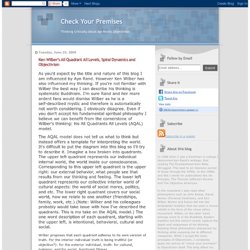
However Ken Wilber has also influenced my thinking. If you're not familiar with Wilber the best way I can describe his thinking is systematic Buddhism. I'm sure Rand and her more ardent fans would dismiss Wilber as he is a self-described mystic and therefore is automatically not worth considering. I obviously disagree. Even if you don't accept his fundamental spiritual philosophy I believe we can benefit from the cornerstone of Wilber's thinking: his All Quadrants All Levels (AQAL) model. The AQAL model does not tell us what to think but instead offers a template for interpreting the world. Wilber proposes that each quadrant adheres to its own version of truth. Wilber contends that most philosophies and ideologies latch onto one of these quadrants then claim their truth applies to everything. If I may digress here is what I mean by explanatory power of SD. The Evolution Religion: Making Sense of Evolution: Review of Carter Phipps' "Evolutionaries" (2012), Frank Visser.
Frank Visser founded IntegralWorld.net in 1997 (back then under the name of "The World of Ken Wilber").
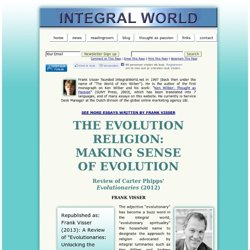
He is the author of the first monograph on Ken Wilber and his work: " Ken Wilber: Thought as Passion " (SUNY Press, 2003), which has been translated into 7 languages, and of many essays on this website. He currently is Service Desk Manager at the Dutch divison of the global online marketing agency LBi. Frank Visser Carter Phipps The adjective "evolutionary" has become a buzz word in the integral world, "evolutionary spirituality" the household name to designate the approach to religion advocated by integral luminaries such as Ken Wilber and Andrew Cohen. The idea is that those who adhere to these ideas, not just hold them as intellectual beliefs—as their academic cousins the "evolutionists" do—but are committed to them as an all encompassing worldview or life style. 'The Real Evolution Debate' The Neo-Darwinists (Dawkins, Gould, Dennet, E.O.
Evolution as Cultural Idea. Ken Wilber's AQAL Metatheory: An Overview, Paul Helfrich. Tuesday, April 15, 2014 PAUL M.
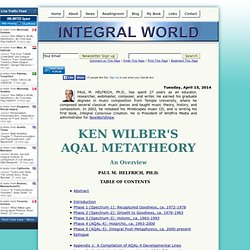
HELFRICH, Ph.D., has spent 27 years as an educator, researcher, webmaster, composer, and writer. He earned his graduate degrees in music composition from Temple University, where he composed several classical music pieces and taught music theory, history, and composition. In 2003, he released his Mindscapes music CD, and is writing his first book, Integral Conscious Creation. He is President of Wildfire Media and administrator for NewWorldView. Paul M. Table of Contents Abstract.